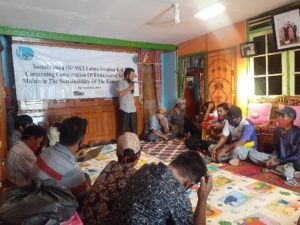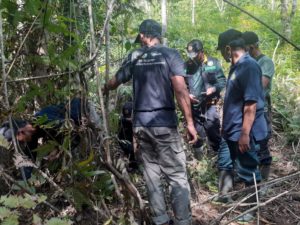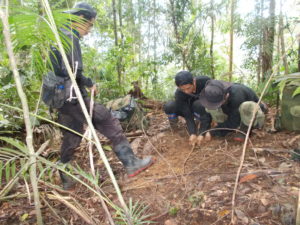This latest project report shows how Lingkar Institute has shown resilience and adaptability in protecting the Sumatran tiger in the face of the coronavirus pandemic in Indonesia.
The project team continue to use the 2014 FATWA issued by the Muslim Council of Indonesia to spread the word that killing endangered species is against the word of God in eight villages in the south of the Kerinci Seblat National Park bringing the number reached to 21 forest-edge communities.
In addition, the Lingkar team are also beginning to mentor known local hunters and recidivists with the assistance of specialist police officers. At times this has been carried out across the phone networks in response to COVID-19. A database is being compiled of known hunters and traders, and 20 are being visited when possible. Lingkar Institute reports that seven have formally renounced poaching so far. The belief is that within these deeply religious communities the knowledge of the FATWA alongside mentoring support and understanding of the important role the tiger plays in the balanced ecosystem will change peoples behaviours, thus protecting the Sumatran tiger. The Lingkar Institute is working with social scientists to devise a way to monitor this programme.
By building a network of supporters in villages surrounding the National Park, the Lingkar team are building a number of sources who have been able to share knowledge with the antipoaching rapid response team. This team is made up of members of the local community in collaboration with the National Park Authority and the Kerinci Seblat TPCU, led by a park ranger.
Project activities and key achievements:
- Intensive socialization of the FATWA MUI No. 04/2014 in eight villages; Suka Datang, Teluk Dien and Ketong Jaya Village Air Banai Village, Taba Padang, Hulu Palik subdistrict, Hulu Palik sub-district across Lebong and North Bengkulu District.
- 14 patrols were conducted by the SMART Patrol Team covering 363 km in 66 days in the field. 29 indications of Sumatran tigers were encountered.
- 45 hunting activities consisting of six inactive tiger snares, four active nylon snares, and 35 passive glue traps were confiscated, the majority of traps were targeted at wild birds.
- During the period February 2020-January 2021, Wildlife Crime Investigations were carried out 48 times, with details of 36 investigations via telephone and 12 times face-to-face. Three potential tiger poachers have been identified.
- Five low-risk human-wildlife conflict situations were responded to by the Rapid response patrol unit.
- The extension to the MOU was signed directly by the Kerinci Seblat National Park center and the Director of the Lingkar Institute. This collaboration is valid for the next three years from 2020-2023.
- Mentoring recidivists started in July and 20 individuals have been visited at least twice and the Lingkar Team will continue to visit and coach.
- A database has been developed holding the details of 64 individuals of note, including known tiger and prey hunters, recidivists and traders.
- The Lingkar Institute sent one staff member to attend training in smart patrol analysis.
- Field training was carried out for 2 new personnel who are tasked with carrying out smart patrol and investigation activities.
- Radio and TV interviews have been given about hunting crimes and efforts to conserve Sumatran tigers in Kerinci Seblat National Park, especially in Bengkulu Province.
- Due to COVID-19, conservation education training could not be carried out.
The project is also supported by a grant from the Auckland Zoo Conservation Fund.

Socialisation meeting 2020 © Lingkar Institute

Responding to threat of human-wildlife conflict 2020 © Lingkar Institute

Patrol team 2020 © Lingkar Institute

